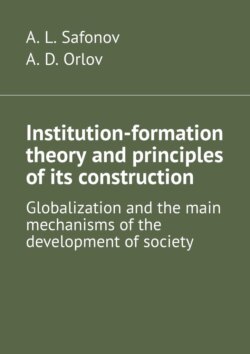Читать книгу Institution-formation theory and principles of its construction. Globalization and the main mechanisms of the development of society - A. L. Safonov - Страница 3
Introduction
ОглавлениеThe main goal of social philosophy has always been to comprehend the leading tendencies of historical development that determine the destiny of society and the individual, in order to find a few key regularities. Its task has been to see the shape of the emerging world in the chaotic events of reality and to give guidance to individuals for the new era.
The key to understanding modernity is, of course, globalization, which is an increasingly multidimensional process of qualitative complication, acceleration, and integration of human development.
Globalization is, first and foremost, a system of qualitative social changes, consisting not only in the formation of a single world market but also in a global social and informational environment, devoid of spatial and political boundaries. Globalization generates unprecedented complications and acceleration of socio-historical processes. It is characterized by global information openness, and the emergence of new information technologies affects individual and mass consciousness directly and without inertia, in real time. This era is characterized by a qualitatively greater number of contacts between geographically distant local communities and individuals, including those not mediated by the state and its institutions.
In more general terms, globalization can be defined as the process of intensification of the entire system of social relations and the formation of a global interaction system. As a result, not only global but also local social phenomena are formed under the influence of distant external causes arising in different regions of our planet. This leads to a comprehensive, worldwide connection of social communities, structures, institutions, and cultures. In the process of globalization, a qualitatively new system of social relations and institutions is taking shape. Consequently, in the modern era, no phenomenon of social being on a local level can be understood outside the comprehensive system of connections with other parts of the global system. Although the world was comprised of a set of relatively closed social systems not long ago, all local social and economic systems have become open today and cannot be studied outside the global context.
In the process of integrating the economic life of individual countries, globalization is increasingly moving beyond the economy in whose terms it was originally defined. Interactions between various actors in society are beginning to take on a universal, total character, which has become impossible to describe with the help of already known particular connections. All of this generates unpredictable chaos, with diverse processes occurring in various spheres of social life. As a consequence, these processes characterize the era as a holistic, yet internally contradictory and unstable system of interrelationships. Globalization as a leading social phenomenon of modernity is the formation, development, and qualitative increase in the connectivity of the global environment. This applies, in particular, to the economic, political, informational, and social spheres. Globalization significantly intensifies interactions within society. Thus, it simultaneously strengthens both the integration and confrontation of all social actors.
The modern era, which is a qualitatively new stage of historical development, is characterized by two developmental trends. The first is that globalization, by creating a single social and economic space, activates those processes that lead to progress in the development of society. The second developmental trend is that, due to the same universal connectivity of all spheres of life of individuals, local crises are transformed into global ones, which have a fundamentally different, more intense level. These crises, because of the peculiarities of globalization, are characterized by qualitatively larger scales than similar phenomena of previous epochs. Thus, globalization manifests itself in two forms. On the one hand, it appears as an era of the emergence of a single economic, political, and social space. The emergence of this phenomenon has led to an unprecedented development of technology and technological knowledge, and, as a consequence, has raised people’s standard of living. On the other hand, globalization manifests itself, in many ways, as an increasingly less stable system of mutually reinforcing crises and disasters in all spheres of existence, leading to a decrease in the stability of all structures and communities of society.
